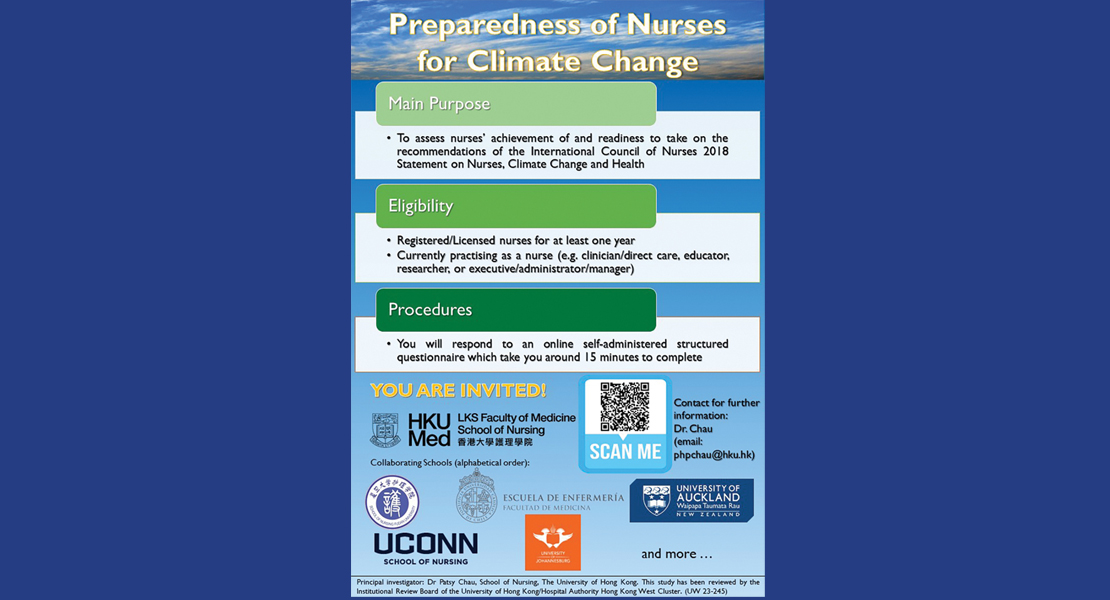
Research
How Nurses Can Help Mitigate the Effects of Climate Change
Professor Patsy Chau Pui-hing | Associate Professor
As the world grapples with the escalating crisis of climate change, our nurses also have valuable contributions to make to mitigating the effects of climate change. Climate change significantly impacts human health, triggering morbidity and mortality due to extreme weather conditions. It exacerbates air pollution, allergens and vectors, posing serious global health risks. Climate change is considered the largest threat to public health gains.
Citizens everywhere can help in the fight against climate change by embracing a green lifestyle. Nurses, however, have the potential to contribute even more. By leveraging their trusted status in society and their roles in patient education, policy advocacy and community engagement, nurses can help to mitigate the health impacts of climate change and promote planetary health. They can amplify messages that drive sustainable behaviours and practices.
The International Council of Nurses’ (ICN’s) 2018 statement “Nurses, Climate Change and Health” promotes the notion that nurses of different positions can make powerful contributions in attenuating climate change and aiding climate vulnerable communities1. These recommendations focus on helping to reduce human-induced climate change and vulnerability to adverse effects from climate change. Despite this potential, however, the details about nurses’ contributions and attitudes in these areas, particularly in clinical settings, are poorly understood. This is especially so outside English-speaking countries.
Picking up on the Universitas 21 (U21)’s theme of “Climate Change and Health”, the School of Nursing of The University of Hong Kong was honoured in 2023 to lead U21’s Nursing & Midwifery Discipline Group in conducting a cross-sectional survey on “Preparedness of Nurses for Climate Change” to address the knowledge gap. Together with experts from Fudan University, Pontificia Universidad Católica de Chile, The University of Auckland, University of Connecticut, and University of Johannesburg, a questionnaire was developed drawing from the ICN 2018 statement and related literature. The questionnaire, available in different languages, can be accessed at: https://hku.au1.qualtrics.com/jfe/form/SV_3rv1aHgDJWE621M Registered nurses with at least one year of practice are eligible for this survey.
While the study is ongoing, preliminary findings from the first 509 valid responses collected from the online platform, including 55% from Asia and 57% involved in clinical practice, were presented in the 13th Hong Kong International Nursing Forum. The data revealed that over 58% of respondents perceived climate change had impacted nursing practice to some extent in the past five years. The top three impacts identified were that climate change made the working environment more challenging, resulted in changes to health education, and increased the number of patients and complexity of care provided. While many respondents had engaged in greener lifestyle choices and empowered others to do the same, fewer had worked with communities to build resilience to the impacts of climate change or engaged in environmental health committees.
Feedback from our respondents indicated that they felt their participation not only generated knowledge about nursing and climate change, but also prompted deep reflection on their own contributions to climate change. We hope this study is just the beginning. We look forward to more comprehensive research in this area, taking into account contextual and cultural differences. In the long run, we aim to foster more opportunities for nurses to contribute towards climate change mitigation and adaptation. Let’s join hands in fighting climate change!
Reference:
- International Council of Nurses. (2018). Nurses, Climate Change and Health. Revised. Available from: https://www.icn.ch/sites/default/files/inline-files/ICN%20PS%20Nurses%252c%20climate%20change%20and%20health%20FINAL%20.pdf






